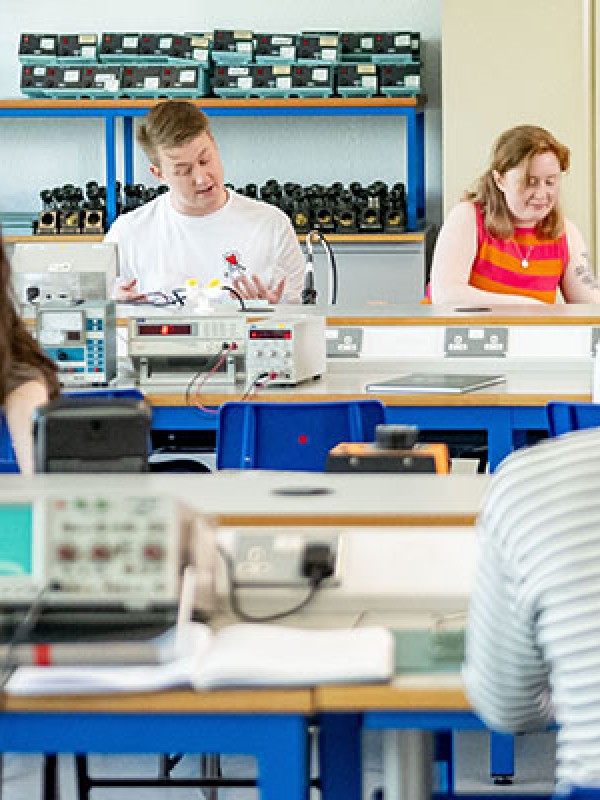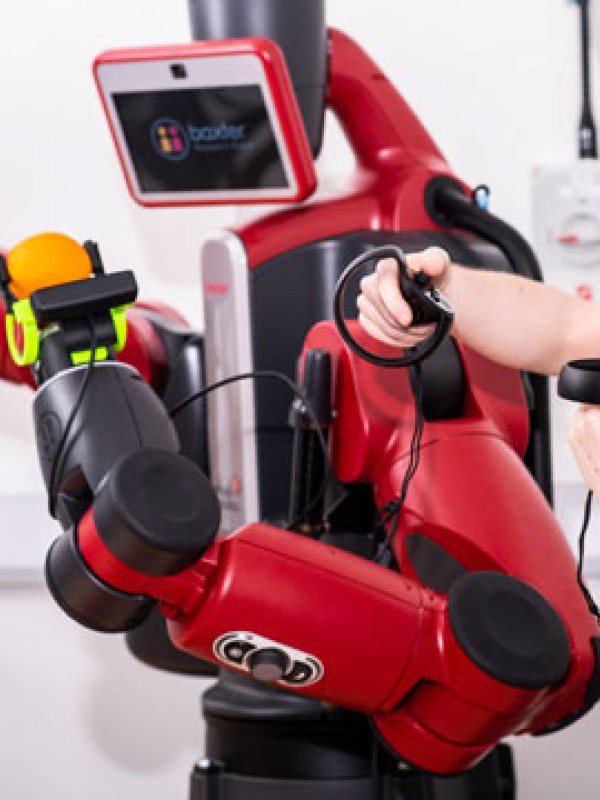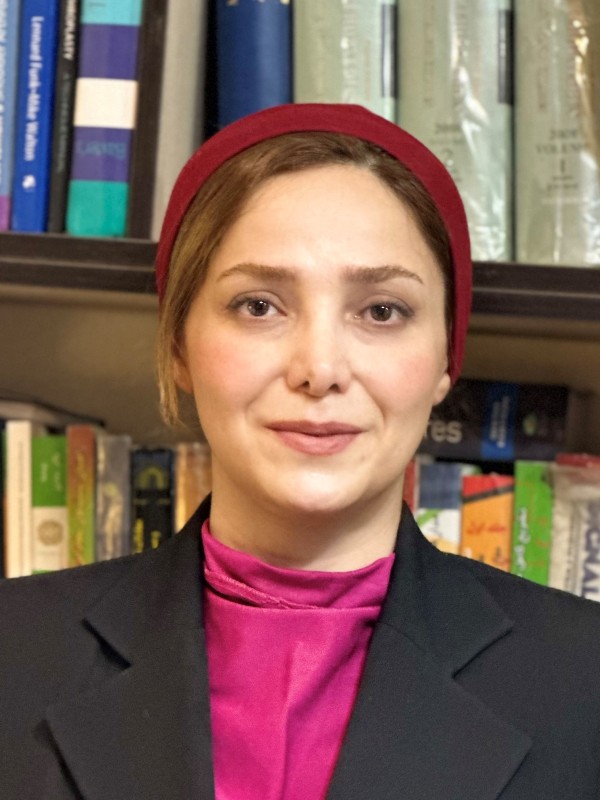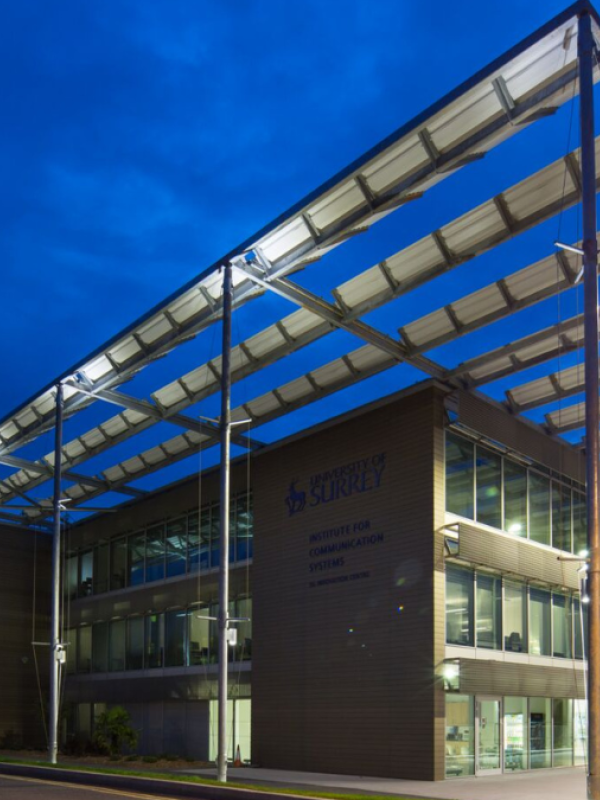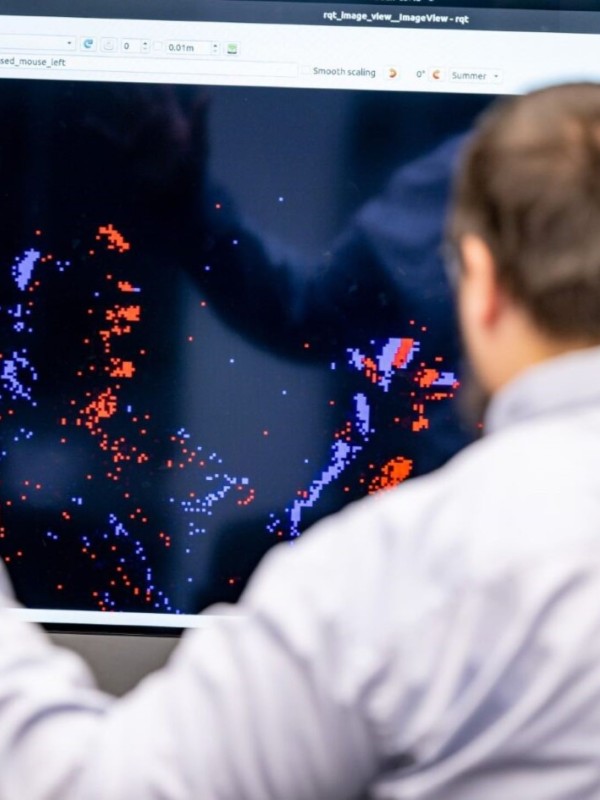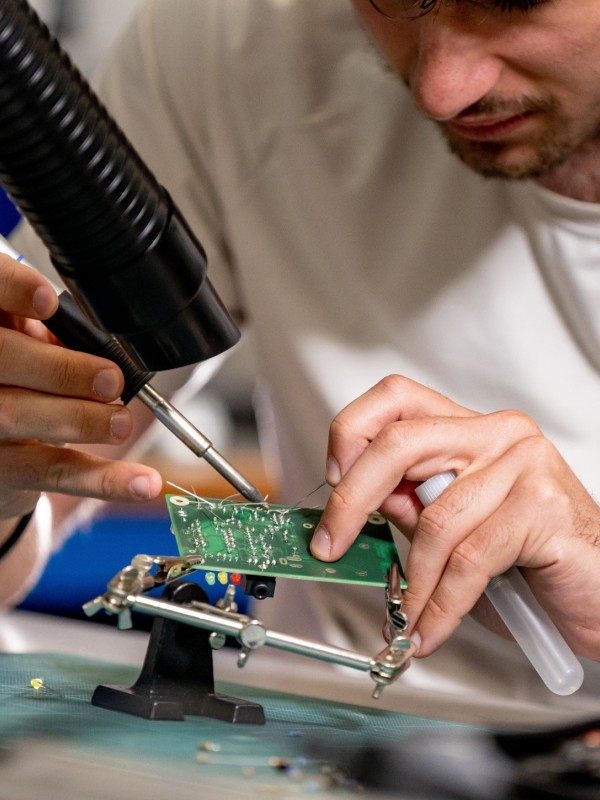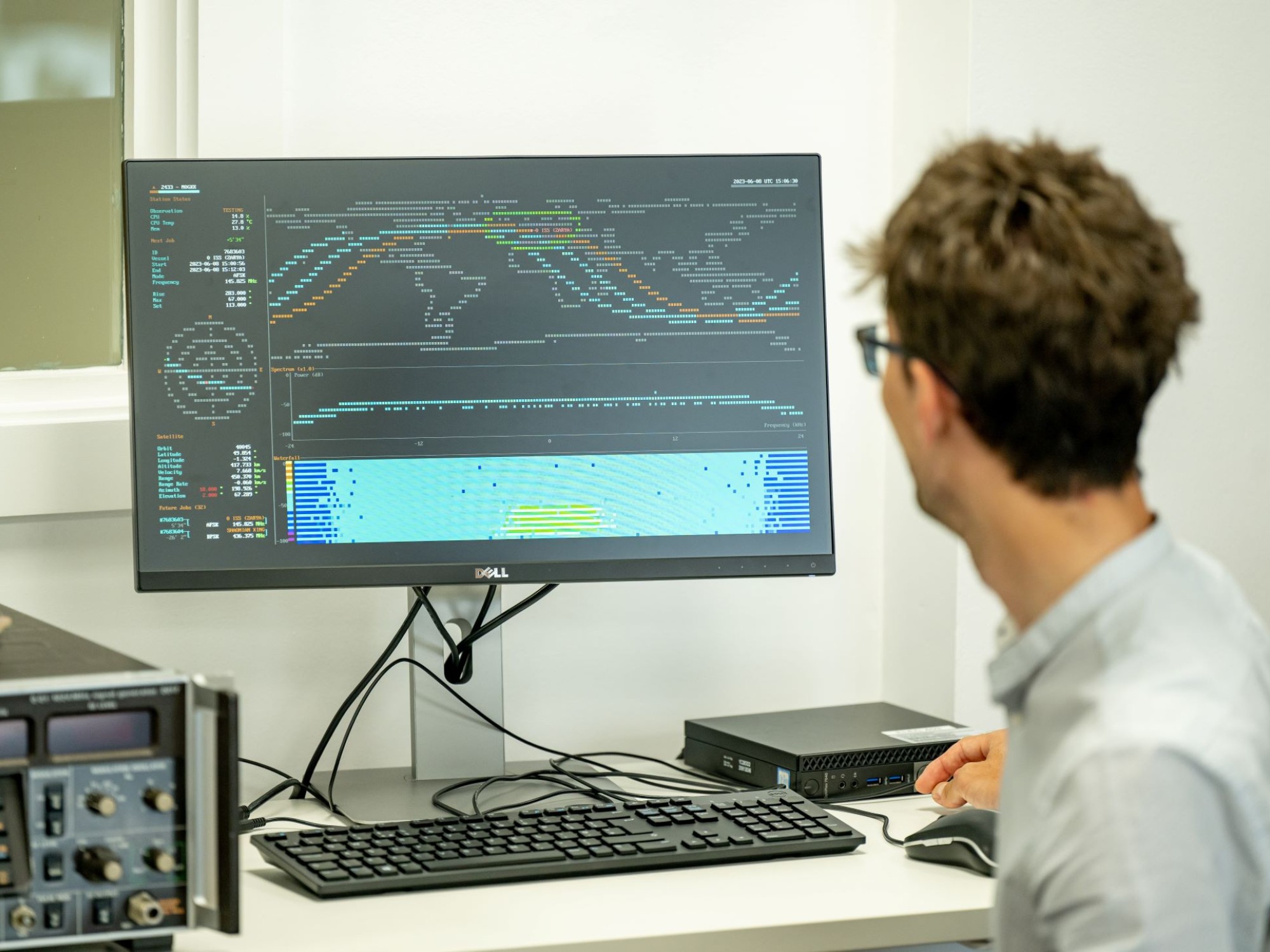
- Satellite Communications Engineering
MSc — 2026 entry Satellite Communications Engineering
Our Satellite Communications Engineering MSc degree provides students with a specialised understanding of the principles, technologies, and applications driving modern satellite communication systems. Graduates of this course are well-prepared to pursue careers in various sectors, including satellite system design and development, satellite manufacturing, telecommunications companies, space agencies, and research institutions.
4,138+ people have created a bespoke digital prospectus
Why choose
this course?
Satellites give us an unprecedented perspective of our planet, and play a fundamental role in the smooth everyday running of a range of critical functions - including transport navigation and GPS, weather and climate monitoring, space, science and global communications.
At Surrey, we’re internationally renowned for our work in satellite communications, broadcasting, terrestrial mobile networks and the internet: essential components of modern communication and information. We can help you on your path to becoming a satellite engineer, working in a huge variety of exciting roles.
We host the Surrey Space Centre – a unique facility made up of academics and engineers from our own spin-out company, Surrey Satellite Technology Ltd.
Our masters in Satellite Communications Engineering is taught by academics and researchers with extensive theoretical expertise and practical knowledge – so you’ll get a learning experience that really is out of this world.
Accreditation
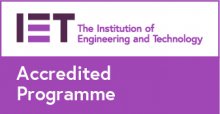
What you will study
Satellite communications enable wireless communication in regions where mobile networking may not be possible. This programme will give you an in-depth understanding of the engineering aspects of these important technologies.
With established links to major satellite manufacturers, operators and service providers, we’re the proud home of the world’s largest academic research group specialising in 5G and 6G communications.
Our 5G/6G Innovation Centre was founded by major national and international players in the communications industry, including the UK’s leading mobile operators. Here, the focus is on the research and development of mobile communications and wireless technology capable of meeting the needs of the digital economy and the world of tomorrow. A key element of this work involves examining how satellites will integrate with future 5G/6G technology.
Professional recognition
MSc - Institution of Engineering and Technology (IET)
Accredited by the Institution of Engineering and Technology (IET) on behalf of the Engineering Council for the purposes of fully meeting the academic requirement for registration as an Incorporated Engineer and partially meeting the academic requirement for registration as a Chartered Engineer.
Research
Our current research concerns high throughput satellite design with advanced payload techniques. We’re also working on mega constellations of satellites and on satellites within 5G.
On the networking side, our work focuses on advanced internet over satellite and satellite security systems.
You’ll complete your project alongside our research teams in these areas and study tailored modules on these advanced techniques.
If you’re studying this course full-time, you’ll study eight modules across the year – four in each semester.
During the first semester, you’ll also apply for and agree on a project with an academic supervisor and begin initial work on the project before working on it full-time after the end of the second semester. From that point, you’ll have approximately two-and-a-half months to complete the work and write up your dissertation.
You can also study this MSc part-time, taking between two and five years. You can study between two and six modules each year and the length taken to complete the MSc depends on how many modules you choose. We recommend part-time students work on their project in their final year of study when all eight modules have either been completed or are near completion.
The structure of our programmes follows clear educational aims that are tailored to each programme. These are all outlined in the programme specifications which include further details such as the learning outcomes:
Modules
Modules listed are indicative, reflecting the information available at the time of publication. Modules are subject to teaching availability, student demand and/or class size caps.
The University operates a credit framework for all taught programmes based on a 15-credit tariff, meaning all modules are comprised of multiples of 15 credits.
Course options
Year 1
Semester 1
Compulsory
Expected prior learning: It is helpful, but not essential, to have taken module EEE2040 – Communications Networks (EEE2040), or to have equivalent learning. Module purpose: This module deals with the three important processing stages of modern digital communication systems which are source coding for signal compression, channel error control coding for robust transmission and modulation for efficient digital interface with the available channel. The module is designed to provide basic-to-intermediate scale introduction of the subject at the UG level and the learning developed in this module can be enhanced further at relevant MEng / MSc level modules (EEEM017, EEEM030, EEEM031)
View full module detailsExpected prior/parallel learning: BEng-level understanding of digital telecommunications systems. MEng students might have partly acquired this through study of EEE3006 – Digital Communications. Module purpose: Satellite communications are an important component of modern telecommunication systems. This module provides the student with an overall understanding of satellite communication systems, technologies and techniques and equips him/her with the design tools to enter employment in the sector. The main goal of this module is to design a satellite communication link to fix or mobile users given a specified quality of service (QoS). To do so, one needs to take into account both telecommunication and satellite related parameters. In this module, you will learn about the satellite payload and how it operates, what is in the earth station and what are the characteristics of the satellite to earth link. In particular, we clearly state the differences in design compared to the terrestrial communication systems We also study in some details the modern satellite networks and constellations. [EEE3006]: This module uses several techniques addressed in digital communications module such as coding and modulation. [EEEM032]: This module is a prerequisite for the advanced satellite communication techniques. [EEEM009],[EEEM059]: Even though other satellite applications such as earth observation or satellites for navigation and positioning are not addressed in this module, however, all such application will eventually need to stablish a communication line with earth. In this sense, this module is closely related to modules on space avionics and navigation, guidance and control.
View full module detailsOptional
IMPORTANT: The second assessment pattern is only applicable to the MSc Short Course Students Expected prior learning: EEE3033 – RF and Microwave Fundamentals, or equivalent learning. Module purpose: Advanced communications systems and radar operate at RF and microwave frequencies. The design principles and circuit operation, underlying these systems, are quite different from those of electronics used in signal processing at baseband frequencies. This module will cover the key elements of RF and microwave system design as well as analysis concepts for a range of commonly used active circuits, including: oscillators, frequency synthesisers, amplifiers and mixers. The module will also cover the circuit design and operation of non-linear devices used in active circuits together with deployment considerations. This module will include and build on many of the concepts studied in EEE3033 RF and Microwave Fundamentals and address further advanced features of non linear RF devices and system optimisation. It is complementary to EEEM064 Microwave Design Techniques and also EEEM006 Antennas and Propagation.
View full module detailsExpected prior learning: None specifically advised. Module purpose: Earth and planetary observation with remote sensing data is playing a key role in the present understanding of natural phenomena, prevention of disasters, resources monitoring, comprehension of origins of life. Through a series of lectures, seminars, open discussions and “thinking breaks” in class, the module aims to give an introduction to the scientific principles of remote sensing – both passive and active – as carried out by spacecraft. Remote sensing is discussed in terms of instrumentation, missions, products and applications. IMPORTANT: The Second assessment pattern (Written Exam) is only applicable to the MSc Short Course Students.
View full module detailsModule purpose: Advances related to energy efficiency issues and cost reductions have resulted in the rapid growth and deployment of networked devices and sensing/actuation systems that connect the physical world with the cyber world. This evolving framework, now recognized as the Artificial Intelligence of Things (AIoT), integrates IoT technologies with artificial intelligence (AI) to enhance automation, intelligence, and decision-making. AIoT incorporates several cutting-edge technologies, including wireless sensor networks, pervasive systems, ambient intelligence, context awareness, distributed systems, and machine learning-driven analytics. Module Overview: The advanced AIoT module is designed to provide a comprehensive understanding of how machine communications , coupled with AI, contribute to creating smart artificial intelligence-driven environments, focusing on networking and communication systems. The module provides an overview of the key concepts and enabling technologies for AIoT. It encompasses a cross-layer approach, allowing students to explore the practical aspects of sensors, actuators, and mainly communication systems for AIoT across physical, media access, and network layers. This includes security considerations, satellite AIoT, positioning and tracking for industrial applications, AIoT Platforms (Hardware, Software), protocols and standards (e.g. 6LowPAN, ZigBee, CoAp), semantic technologies, and data and information processing mechanisms. Also, the module explores AI-driven methodologies such as ensemble learning, multi-armed bandits for sequential decision-making, and lightweight machine learning Mmodels for AIoT applications. These techniques enhance real-time data analysis, predictive maintenance, anomaly detection, and adaptive control while ensuring computational efficiency.
View full module detailsSemester 2
Compulsory
Expected prior/parallel learning: This module covers advanced topics on satellite communications and networks, following the Satellite Communication fundamentals (EEEM031). An alternate module containing suitable prior learning is, Space System Design (EEE3040). Module purpose: This module covers advanced topics on satellite communications and networks. These networks are an important part of global information infrastructure providing broadcasting, mobile and broadband services to millions of homes and offices as well as disaster relieves and emergency communications services.
View full module detailsCore
This module is aimed at forming essential professional skills and competences in research and innovation for master level students studying in programmes relating to computer science and/or electronic engineering. It will therefore serve as an important initial module towards planning and executing the dissertation project through learning about literature reviewing and research methodologies. Furthermore, it will facilitate team building skills through identifying individual strengths and exercising capability through group design work. This experience will also make the student aware of the challenges of working effectively with other people.
View full module detailsOptional
Expected prior learning: Module EEE2040 – Communications Networks or equivalent learning. Module purpose: The Internet is an important worldwide communications system; the module provides an in-depth treatment of current and evolving Internet protocols and standards, and the algorithms that underlie them. The module also permits further study on networking in modules such as EEEM018 Advanced Mobile Communication Systems, EEEM023 Network Service management and Control, EEEM032 Advanced Satellite Communication Techniques
View full module detailsExpected Prior Learning: Module EEE3040 Space Systems Design, or equivalent module. Module Purpose: Through a series of lectures and a design assignment, the module aims to give an introduction to the engineering design principles, requirements and solutions for satellite avionics. This module builds on from many Electronic Engineering modules at undergraduate level in the topics of RF/Communications (EEE3033), Processor Design (EEE3027), and C coding Software (EEE1035 and EEE2047).
View full module detailsIMPORTANT: The second assessment pattern is only applicable to the MSc Short Course Students Expected prior learning: None. Module purpose: Antennas and the propagation of radio on the physical layer (PHY) are a fundamental aspect of communications, space and radar as well as any other device that will radiate electromagnetic waves over an air interface. In order for wireless devices to operate and comply with suitable standards, it is important that they use a suitable antenna design, while also modelling the propagation environment the device may encounter is important for purposes of testing the radio transceiver, thus knowledge of propagation modelling is required to achieve this.
View full module detailsThe module introduces general information and network security principles, challenges and goals and then focuses on main security mechanisms and protocols for protecting network communication across different layers of the Internet protocol stack. This will include discussion on various attacks on the networks, penetration testing tools and possible countermeasures to ensure protection of authentication, confidentiality and end-to-end security of communications. In labs students will be able to practice experience with various network security protocols and tools.
View full module detailsExpected prior learning: EEE3033–RF and Microwave Fundamentals, or equivalent learning. Module purpose: At Gigahertz frequencies the operating wavelength is small. Devices operating in the Gigahertz frequency range are therefore electrically large compared to the operating wavelength. In such cases, it is no longer appropriate to use traditional lumped element circuit components. The passive devices used at Gigahertz frequencies thus have to be made either using printed transmission lines (e.g. microstrip, coplanar waveguide) or waveguide. This module will present microwave design and analysis concepts for a range of commonly used passive circuits using both microstrip lines and waveguides, including: transmission lines, coupling networks, antennas and filters. This module will revisit and build on the use of the Smith chart also introduced in EEE3033 RF and Microwave Fundamentals and use it for further design applications of microstrip circuits. It is complementary to module EEEM044 RF Systems and Circuit Design and EEEM006 Antennas and Propagation.
View full module detailsSemester 1 & 2
Core
Expected prior learning: Appropriate background knowledge related to the project topic. Module purpose: This is an individual student project module giving each masters student an opportunity to gain realistic experience in developing a solution to a problem from its inception to a demonstrable result. It provides a framework as well as a vehicle for exercising all key aspects of project work, from project specification, through literature and technology research, leading to project planning, problem solving as well as design and implementation, culminating in performance assessment, project demonstration, and project evaluation. It also provides a scope for gaining practical experience interpersonal skills, use of IT, project management, project reporting and project presentation. The project can be either of engineering design nature or have a research flavour. This module is complementary to all other taught modules in order to apply the learning gained into undertaking an independent piece of research and/or development.
View full module detailsOptional modules for Year 1 (full-time) - FHEQ Levels 6 and 7
FOUR in total
A full-time student must choose:
TWO in Semester 1
TWO in Semester 2
A part-time student must complete study of four optional modules within 60 months.
Unstructured years
Semester 1
Compulsory
Expected prior learning: It is helpful, but not essential, to have taken module EEE2040 – Communications Networks (EEE2040), or to have equivalent learning. Module purpose: This module deals with the three important processing stages of modern digital communication systems which are source coding for signal compression, channel error control coding for robust transmission and modulation for efficient digital interface with the available channel. The module is designed to provide basic-to-intermediate scale introduction of the subject at the UG level and the learning developed in this module can be enhanced further at relevant MEng / MSc level modules (EEEM017, EEEM030, EEEM031)
View full module detailsExpected prior/parallel learning: BEng-level understanding of digital telecommunications systems. MEng students might have partly acquired this through study of EEE3006 – Digital Communications. Module purpose: Satellite communications are an important component of modern telecommunication systems. This module provides the student with an overall understanding of satellite communication systems, technologies and techniques and equips him/her with the design tools to enter employment in the sector. The main goal of this module is to design a satellite communication link to fix or mobile users given a specified quality of service (QoS). To do so, one needs to take into account both telecommunication and satellite related parameters. In this module, you will learn about the satellite payload and how it operates, what is in the earth station and what are the characteristics of the satellite to earth link. In particular, we clearly state the differences in design compared to the terrestrial communication systems We also study in some details the modern satellite networks and constellations. [EEE3006]: This module uses several techniques addressed in digital communications module such as coding and modulation. [EEEM032]: This module is a prerequisite for the advanced satellite communication techniques. [EEEM009],[EEEM059]: Even though other satellite applications such as earth observation or satellites for navigation and positioning are not addressed in this module, however, all such application will eventually need to stablish a communication line with earth. In this sense, this module is closely related to modules on space avionics and navigation, guidance and control.
View full module detailsOptional
IMPORTANT: The second assessment pattern is only applicable to the MSc Short Course Students Expected prior learning: EEE3033 – RF and Microwave Fundamentals, or equivalent learning. Module purpose: Advanced communications systems and radar operate at RF and microwave frequencies. The design principles and circuit operation, underlying these systems, are quite different from those of electronics used in signal processing at baseband frequencies. This module will cover the key elements of RF and microwave system design as well as analysis concepts for a range of commonly used active circuits, including: oscillators, frequency synthesisers, amplifiers and mixers. The module will also cover the circuit design and operation of non-linear devices used in active circuits together with deployment considerations. This module will include and build on many of the concepts studied in EEE3033 RF and Microwave Fundamentals and address further advanced features of non linear RF devices and system optimisation. It is complementary to EEEM064 Microwave Design Techniques and also EEEM006 Antennas and Propagation.
View full module detailsExpected prior learning: None specifically advised. Module purpose: Earth and planetary observation with remote sensing data is playing a key role in the present understanding of natural phenomena, prevention of disasters, resources monitoring, comprehension of origins of life. Through a series of lectures, seminars, open discussions and “thinking breaks” in class, the module aims to give an introduction to the scientific principles of remote sensing – both passive and active – as carried out by spacecraft. Remote sensing is discussed in terms of instrumentation, missions, products and applications. IMPORTANT: The Second assessment pattern (Written Exam) is only applicable to the MSc Short Course Students.
View full module detailsModule purpose: Advances related to energy efficiency issues and cost reductions have resulted in the rapid growth and deployment of networked devices and sensing/actuation systems that connect the physical world with the cyber world. This evolving framework, now recognized as the Artificial Intelligence of Things (AIoT), integrates IoT technologies with artificial intelligence (AI) to enhance automation, intelligence, and decision-making. AIoT incorporates several cutting-edge technologies, including wireless sensor networks, pervasive systems, ambient intelligence, context awareness, distributed systems, and machine learning-driven analytics. Module Overview: The advanced AIoT module is designed to provide a comprehensive understanding of how machine communications , coupled with AI, contribute to creating smart artificial intelligence-driven environments, focusing on networking and communication systems. The module provides an overview of the key concepts and enabling technologies for AIoT. It encompasses a cross-layer approach, allowing students to explore the practical aspects of sensors, actuators, and mainly communication systems for AIoT across physical, media access, and network layers. This includes security considerations, satellite AIoT, positioning and tracking for industrial applications, AIoT Platforms (Hardware, Software), protocols and standards (e.g. 6LowPAN, ZigBee, CoAp), semantic technologies, and data and information processing mechanisms. Also, the module explores AI-driven methodologies such as ensemble learning, multi-armed bandits for sequential decision-making, and lightweight machine learning Mmodels for AIoT applications. These techniques enhance real-time data analysis, predictive maintenance, anomaly detection, and adaptive control while ensuring computational efficiency.
View full module detailsSemester 2
Compulsory
Expected prior/parallel learning: This module covers advanced topics on satellite communications and networks, following the Satellite Communication fundamentals (EEEM031). An alternate module containing suitable prior learning is, Space System Design (EEE3040). Module purpose: This module covers advanced topics on satellite communications and networks. These networks are an important part of global information infrastructure providing broadcasting, mobile and broadband services to millions of homes and offices as well as disaster relieves and emergency communications services.
View full module detailsCore
This module is aimed at forming essential professional skills and competences in research and innovation for master level students studying in programmes relating to computer science and/or electronic engineering. It will therefore serve as an important initial module towards planning and executing the dissertation project through learning about literature reviewing and research methodologies. Furthermore, it will facilitate team building skills through identifying individual strengths and exercising capability through group design work. This experience will also make the student aware of the challenges of working effectively with other people.
View full module detailsOptional
Expected prior learning: Module EEE2040 – Communications Networks or equivalent learning. Module purpose: The Internet is an important worldwide communications system; the module provides an in-depth treatment of current and evolving Internet protocols and standards, and the algorithms that underlie them. The module also permits further study on networking in modules such as EEEM018 Advanced Mobile Communication Systems, EEEM023 Network Service management and Control, EEEM032 Advanced Satellite Communication Techniques
View full module detailsExpected Prior Learning: Module EEE3040 Space Systems Design, or equivalent module. Module Purpose: Through a series of lectures and a design assignment, the module aims to give an introduction to the engineering design principles, requirements and solutions for satellite avionics. This module builds on from many Electronic Engineering modules at undergraduate level in the topics of RF/Communications (EEE3033), Processor Design (EEE3027), and C coding Software (EEE1035 and EEE2047).
View full module detailsIMPORTANT: The second assessment pattern is only applicable to the MSc Short Course Students Expected prior learning: None. Module purpose: Antennas and the propagation of radio on the physical layer (PHY) are a fundamental aspect of communications, space and radar as well as any other device that will radiate electromagnetic waves over an air interface. In order for wireless devices to operate and comply with suitable standards, it is important that they use a suitable antenna design, while also modelling the propagation environment the device may encounter is important for purposes of testing the radio transceiver, thus knowledge of propagation modelling is required to achieve this.
View full module detailsThe module introduces general information and network security principles, challenges and goals and then focuses on main security mechanisms and protocols for protecting network communication across different layers of the Internet protocol stack. This will include discussion on various attacks on the networks, penetration testing tools and possible countermeasures to ensure protection of authentication, confidentiality and end-to-end security of communications. In labs students will be able to practice experience with various network security protocols and tools.
View full module detailsExpected prior learning: EEE3033–RF and Microwave Fundamentals, or equivalent learning. Module purpose: At Gigahertz frequencies the operating wavelength is small. Devices operating in the Gigahertz frequency range are therefore electrically large compared to the operating wavelength. In such cases, it is no longer appropriate to use traditional lumped element circuit components. The passive devices used at Gigahertz frequencies thus have to be made either using printed transmission lines (e.g. microstrip, coplanar waveguide) or waveguide. This module will present microwave design and analysis concepts for a range of commonly used passive circuits using both microstrip lines and waveguides, including: transmission lines, coupling networks, antennas and filters. This module will revisit and build on the use of the Smith chart also introduced in EEE3033 RF and Microwave Fundamentals and use it for further design applications of microstrip circuits. It is complementary to module EEEM044 RF Systems and Circuit Design and EEEM006 Antennas and Propagation.
View full module detailsSemester 1 & 2
Core
Expected prior learning: Appropriate background knowledge related to the project topic. Module purpose: This is an individual student project module giving each masters student an opportunity to gain realistic experience in developing a solution to a problem from its inception to a demonstrable result. It provides a framework as well as a vehicle for exercising all key aspects of project work, from project specification, through literature and technology research, leading to project planning, problem solving as well as design and implementation, culminating in performance assessment, project demonstration, and project evaluation. It also provides a scope for gaining practical experience interpersonal skills, use of IT, project management, project reporting and project presentation. The project can be either of engineering design nature or have a research flavour. This module is complementary to all other taught modules in order to apply the learning gained into undertaking an independent piece of research and/or development.
View full module detailsOptional modules for Unstructured (3-5 years) - FHEQ Levels 6 and 7
Four optional modules in total
General course information
Contact hours
Contact hours can vary across our modules. Full details of the contact hours for each module are available from the University of Surrey's module catalogue. See the modules section for more information.
Timetable
New students will receive their personalised timetable during Welcome Week. In later semesters, at least one week before the start of the semester.
Scheduled teaching can take place on any day of the week (Monday – Friday), with part-time classes normally scheduled for one or two days. Wednesday afternoons tend to be for sports and cultural activities.
View our code of practice for the scheduling of teaching and assessment (PDF) for more information.
Location
This course is based at Stag Hill campus. Stag Hill is the University's main campus and where the majority of our courses are taught.
We offer careers information, advice and guidance to all students whilst studying with us, which is extended to our alumni for three years after leaving the University.
Graduates of our satellite engineering course can be found in most of the world’s main satellite companies in roles such as satellite global communications network engineer and satellite radio access engineer. Our graduates form an active Surrey alumni group and have been employed by companies such as:
- Airbus
- BT/EE
- Eutelsat
- Inmarsat
- OFCOM
- Satellite Applications Catapult
- SES
- Vodafone.
We host the Surrey Space Centre – a unique facility made up of academics and engineers from our own spin-out company, Surrey Satellite Technology Ltd.
Our Mission Control Centre was designed and developed by students to support international CubeSat operations as part of the GENSO network, and also supports the development of our own educational satellites.
Our teaching laboratories provide hands-on experience of satellite design and construction using EyasSAT nano-satellite kits. They also house meteorological satellite receiving stations for the live reception of satellite weather images.
Elsewhere, our fully equipped RF Lab has a network analyser, and signal and satellite link simulators. The Rohde and Schwartz Satellite Networking Laboratory includes DVBS2-RCS generation and measurement equipment, and roof-mounted antennas for communicating live with satellites. A security testbed also exists for satellite security evaluation.
We have a full range of software support for assignments and project work, including MATLAB, and you’ll be able to access system simulators already built in-house.
You can also make use of SatNEx, a European Network of Excellence in satellite communications, supported by the European Space Agency. This is a satellite platform that exists to link the 22 partners around Europe. It’s used for virtual meetings and allows you to participate in lectures and seminars presented by partners.
Our own spin-out company, Surrey Satellite Technology Ltd, is situated close to the University on Surrey Research Park and provides ready access to satellite production and industrial facilities. We also have strategic relationships with Airbus and several other major communications companies.
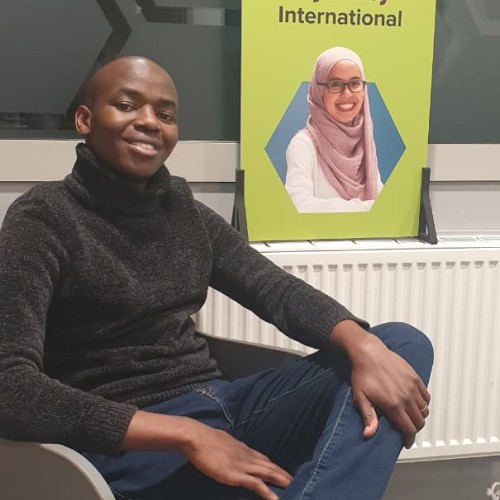
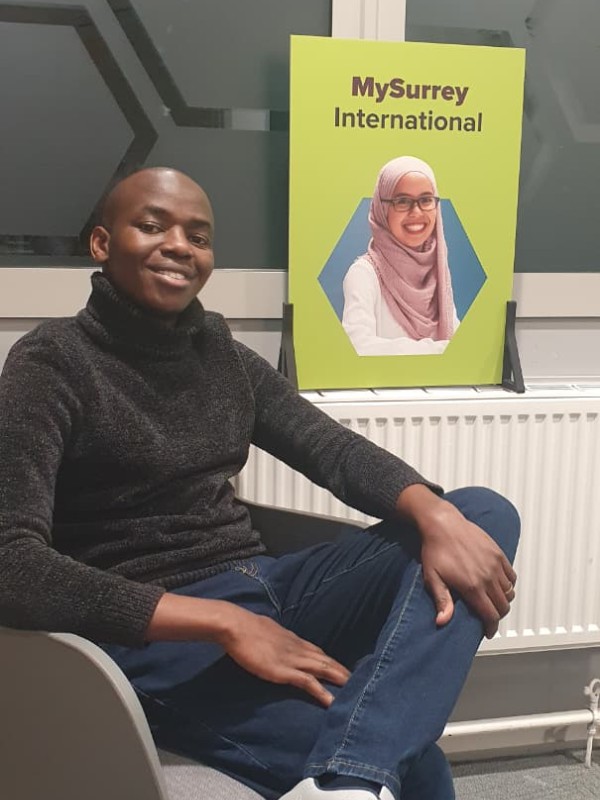
Nicholas K.
Student - Satellite Communications Engineering MSc
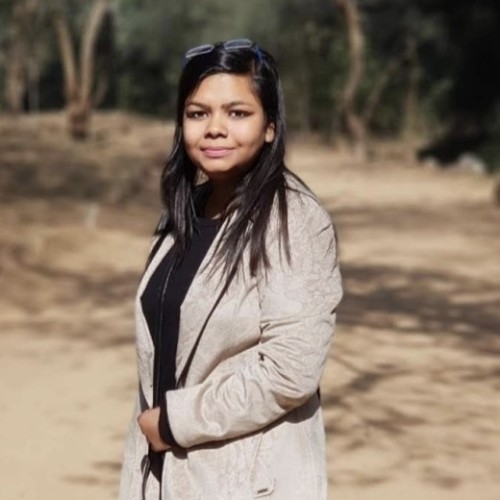
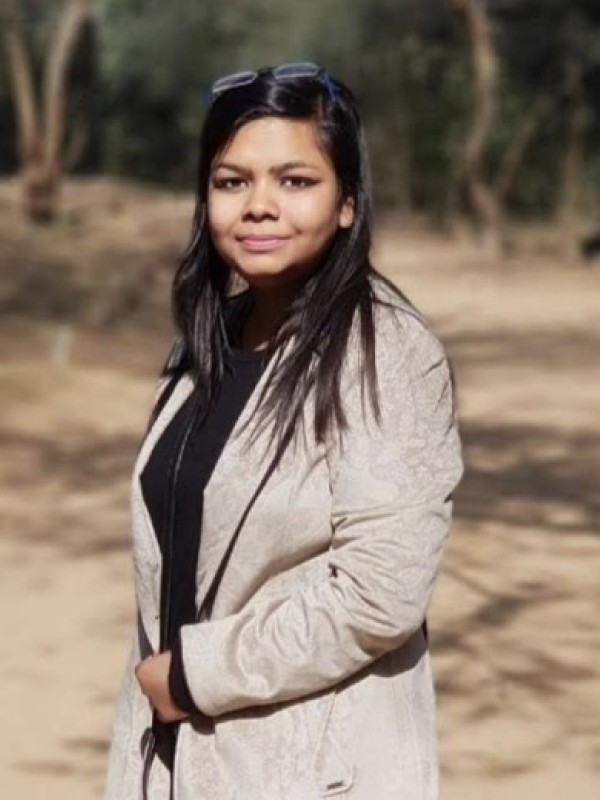
Muskan
Graduate - Satellite Communications Engineering MSc
UK qualifications
A minimum of a 2:2 UK honours degree in communication engineering, computer engineering, electrical engineering, electrical and computer engineering, electronic engineering, information and communication technologies, physics or telecommunication engineering, or a recognised equivalent international qualification.
We'll also consider relevant work experience if you don't meet these requirements.
English language requirements
IELTS Academic: 6.5 overall with 6.0 in writing and 5.5 in each other element.
These are the English language qualifications and levels that we can accept.
If you do not currently meet the level required for your programme, we offer intensive pre-sessional English language courses, designed to take you to the level of English ability and skill required for your studies here.
Recognition of prior learning
We recognise that many students enter their course with valuable knowledge and skills developed through a range of ways.
If this applies to you, the recognition of prior learning process may mean you can join a course without the formal entry requirements, or at a point appropriate to your previous learning and experience.
There are restrictions for some courses and fees may be payable for certain claims. Please contact the Admissions team with any queries.
Scholarships and bursaries
Discover what scholarships and bursaries are available to support your studies.
Fees
Explore UKCISA’s website for more information if you are unsure whether you are a UK or overseas student. View the list of fees for all postgraduate courses.
September 2026 - Full-time - 1 year
- UK
- £12,900
- Overseas
- £25,900
September 2026 - Part-time - 5 years
- UK
- £1,500 per 15 credits
- Overseas
- £2,900 per 15 credits
- The dissertation module is charged as a 15-credit module for fee purposes
- These fees apply to the academic year 2026-27 only. Fees are reviewed annually, and tuition fees may increase for courses running over more than one year.
Payment schedule
- Students with Tuition Fee Loan: the Student Loans Company pay fees in line with their schedule (students on an unstructured self-paced part-time course are not eligible for a Tuition Fee Loan).
- Students without a Tuition Fee Loan: pay their fees either in full at the beginning of the programme or in two instalments as follows:
- 50% payable 10 days after the invoice date (expected to be October/November of each academic year)
- 50% in January of the same academic year.
- Students on part-time programmes where fees are paid on a modular basis: cannot pay fees by instalment.
- Sponsored students: must provide us with valid sponsorship information that covers the period of study.
The exact date(s) will be on invoices.
Additional costs
Costs may be incurred associated with the purchase of writing paper and associated stationery.
Funding
You may be able to borrow money to help pay your tuition fees and support you with your living costs. Find out more about postgraduate student finance.
Apply online
To apply online first select the course you'd like to apply for then log in.
Select your course
Choose the course option you wish to apply for.
Sign in
Create an account and sign into our application portal.
Please note that we may have to close applications before the stated deadline if we receive a high volume of suitable applications. We advise you to submit your application as soon as it is ready.
ApplyPlease note that we may have to close applications before the stated deadline if we receive a high volume of suitable applications. We advise you to submit your application as soon as it is ready.
ApplyAdmissions information
Once you apply, you can expect to hear back from us within 14 days. This might be with a decision on your application or with a request for further information.
Our code of practice for postgraduate taught admissions explains how the Admissions team considers applications and admits students. Read our postgraduate applicant guidance for more information on applying.
About the University of Surrey
Need more information?
Contact our Admissions team or talk to a current University of Surrey student online.
Terms and conditions
When you accept an offer to study at the University of Surrey, you are agreeing to follow our policies and procedures, student regulations, and terms and conditions.
We provide these terms and conditions at offer stage and are shown again at registration. You will be asked to accept these terms and conditions when you accept the offer made to you.
View our generic registration terms and conditions (PDF) for the 2025/26 academic year, as a guide on what to expect.
Disclaimer
This online prospectus has been published in advance of the academic year to which it applies.
Whilst we have done everything possible to ensure this information is accurate, some changes may happen between publishing and the start of the course.
It is important to check this website for any updates before you apply for a course with us. Read our full disclaimer.
